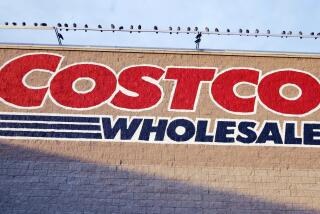Electronic Tabs Kept on Habits of Shoppers
- Share via
If you’ve got a three-Twinkie-a-day habit you’ve been keeping under wraps, forget it. You may not be able to hide it much longer.
Catalina Marketing Corp. could soon know more about many consumers’ basic buying habits than even their mothers. And they are gathering and using that information at your friendly neighborhood grocery.
On Monday, Anaheim-based Catalina will begin testing its latest in-store marketing program: a “frequent shopper” reward system akin to trading stamps and airlines’ frequent flyer programs.
The experiment, called “Checkout Savings,” will offer rebates or merchandise to loyal shoppers at four Ralphs, including stores in Costa Mesa, Huntington Beach and Orange, and four Luckys, including stores in Buena Park and El Toro. Four Giant stores, part of an East Coast supermarket chain, will also participate in the program.
This is not Catalina’s first high-tech marketing effort for supermarkets. The electronic marketing firm made its name with the “Coupon $olution,” a computer process which allows supermarket checkers to hand cents-off coupons to customers at the cash register.
That system, which is used at more than 1,700 supermarkets, attempts to sell certain products to specific shoppers--giving coupons for salsa to tortilla buyers or providing coupons for Coca-Cola to Pepsi drinkers.
In just six years, privately owned Catalina has become the nation’s leading in-store electronic marketer. The firm expects to report revenue of about $26 million this year and to report its first annual profit.
The road hasn’t been easy.
In fact, Catalina’s chief executive, Michael O’Brien, refers to himself as “the guy with the arrows in his back.” It’s no wonder. For years, O’Brien has made a living off some consumers’ pet peeves: TV commercials, cents-off coupons, bar scanners and now, computer lists.
He began as a marketing researcher, testing shoppers’ response to TV commercials. Then in 1976, he and Tom Mindrum, Catalina’s former vice president of marketing, founded TRIM Inc. The company used data from supermarket scanners to gauge manufacturers’ sales. The program could tell a frozen-food maker, for instance, that it had a 10% market share one week and 15% the next.
TRIM’s sales grew to about $5 million before it was sold in 1982.
By then, Mindrum had another idea: Why not figure out a way that manufacturers could target their coupons--so that households without babies, for example, wouldn’t receive coupons for discounts on diapers?
“If we could give people a coupon (based) on what they bought, it would be much more effective,” O’Brien explained.
O’Brien and Mindrum (who recently left Catalina to start his own firm) teamed with George Off, then an executive with Lucky, and Mike Scroggie, a computer software executive. Each chipped in $50,000 and they began developing a way to match shoppers with coupons they had a good chance of using.
Testing Started in ’83
Testing of Coupon $olution began in 1983 at six Wegmans supermarkets in Rochester, N.Y. The system clicked. Over a 22-week test, stores with the system saw sales jump an average of 19% over outlets without the in-store coupons.
Catalina expanded into Southern California in 1984, picking up Ralphs and Boys Markets, among other major chains. To help finance the expansion, the firm brought in venture capital.
Today, the founders own 33%, with the rest owned by employees and institutional investors. The company has 140 employees in 13 offices across the nation.
Whether Checkout Savings will make Catalina the A.C. Nielsen of the supermarket industry remains to be seen. Some marketing experts suggest that the programs won’t build faithful buyers so much as lure former coupon-clippers who will pick up whatever soap or cereal is cheapest that week.
Manufacturers are taking a wait-and-see approach--so far, 40 have signed on, compared with 150 for Coupon $olution.
But Catalina isn’t worried.
Eventually, O’Brien predicts, the day may come when frequent shopper programs could control what coupons will appear in your mailbox. There may even come the day when your grocery store purchases will affect what commercials are beamed to your home.
More to Read
Inside the business of entertainment
The Wide Shot brings you news, analysis and insights on everything from streaming wars to production — and what it all means for the future.
You may occasionally receive promotional content from the Los Angeles Times.










